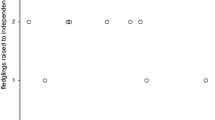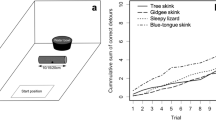Abstract
A robust understanding of cognitive variation at the individual level is essential to understand selection for and against cognitive traits. Studies of animal cognition often assume that within-individual performance is highly consistent. When repeated tests of individuals have been conducted, the effects of test order (the overall sequence in which different tests are conducted) and test number (the ordinal number indicating when a specific test falls within a sequence)—in particular the potential for individual performance to improve with repeated testing—have received limited attention. In our study, we investigated test order and test number effects on individual performance in three inhibitory control tests in Western Australian magpies (Cracticus tibicen dorsalis). We presented adult magpies with three novel inhibitory control tasks (detour-reaching apparatuses) in random order to test whether experience of cognitive testing and the order in which the apparatuses were presented were predictors of cognitive performance. We found that neither test number nor test order had an effect on cognitive performance of individual magpies when presenting different variants of inhibitory control tasks. This suggests that repeated testing of the same cognitive trait, using causally identical but visually distinct cognitive tasks, does not confound cognitive performance. We recommend that repeated testing effects of cognitive performance in other species be studied to broadly determine the validity of repeated testing in animal cognition studies.






Similar content being viewed by others
Data availability
Data available on request from the corresponding author.
Code availability
SPSS outputs available on request from the corresponding author.
References
Amici F, Aureli F, Call J (2008) Fission-fusion dynamics, behavioral flexibility, and inhibitory control in primates. Curr Biol 18:1415–1419
Ashton BJ (2017) The causes and consequences of individual variation in cognitive ability in the cooperatively breeding Australian magpie (Cracticus tibicen dorsalis). PhD thesis. University of Western Australia
Ashton BJ, Ridley AR, Edwards EK, Thornton A (2018a) Cognitive performance is linked to group size and affects fitness in Australian magpies. Nature 554:364–367
Ashton BJ, Thornton A, Ridley AR (2018b) An intraspecific appraisal of the social intelligence hypothesis. Phil Trans R Soc B 373:20170288
Ashton BJ, Ridley AR, Thornton A (2018c) Smarter through group living: a response to Smulders. Learn Behav 45:1–3
Ashton BJ, Thornton A, Ridley AR (2019) Larger group sizes facilitate the emergence and spread of innovations in a group-living bird. Anim Behav 158:1–7
Ashton BJ, Thornton A, Cauchoix M, Ridley AR (2022) Long-term repeatability of cognitive performance. R Soc Open Sci 9:220069
Bell AM, Hankison SJ, Laskowski KL (2009) The repeatability of behaviour: a meta-analysis. Anim Behav 77:771–783
Blackburn G, Broom E, Ashton BJ, Thornton A, Ridley AR (2022) Heat stress inhibits cognitive performance in wild Western Australian magpies, Cracticus tibicen dorsalis. Anim Behav 188:1–11
Boogert NJ, Anderson RC, Peters S, Searcy WA, Nowicki S (2011) Song repertoire size in male song sparrows correlates with detour reaching, but not with other cognitive measures. Anim Behav 81:1209–1216
Boogert NJ, Madden JR, Morand-Ferron J, Thornton A (2018) Measuring and understanding individual differences in cognition. Phil Trans R Soc B 373:20170280
Brucks D, Marshall-Pescini S, Range F (2018) Dogs and wolves do not differ in their inhibitory control abilities in a non-social test battery. Anim Cogn 22:1–15
Carroll JB, Maxwell SE (1979) Individual differences in cognitive abilities. Annu Rev Psychol 30:603–640
Cauchoix M et al (2018) The repeatability of cognitive performance: a meta-analysis. Phil Trans R Soc B 373:20170281
Cauchoix M, Chaine AS, Barragan-Jason G (2020) Cognition in context: plasticity in cognitive performance in response to ongoing environmental variables. Front Ecol Evol 8:106
Damerius LA, Burkart JM, van Noordwijk MA, Haun DBM, Kosonen ZK, Galdikas BMF, Saraswati Y, Kurniawan D, van Schaik CP (2019) General cognitive abilities in orangutans (Pongo abelii and Pongo pygmaeus). Intelligence 74:3–11
Ducatez S, Audet JN, Lefebvre L (2019) Speed–accuracy trade-off, detour reaching and response to PHA in Carib grackles. Anim Cogn 22:625–633
Dwyer FM, De Melo H (2015) Effects of mode of instruction, testing, order of testing, and cued recall on student achievement. J Exp Educ 52:86–94
Griffin AS, Guillette LM, Healy SD (2015) Cognition and personality: an analysis of an emerging field. Trends Ecol Evol 30:207–214
Guillette LM, Hahn AH, Hoeschele M, Przyslupski A, Sturdy CB (2015) Individual differences in learning speed, performance accuracy and exploratory behaviour in black-capped chickadees. Anim Cogn 18:165–178
Harrison XA et al (2018) A brief introduction to mixed effects modelling and multi-model inference in ecology. PeerJ 6:e4794
Henke-von der Malsburg J, Fichtel C (2018) Are generalists more innovative than specialists? A comparison of innovative abilities in two wild sympatric mouse lemur species. R Soc Open Sci 5:180480
Hobhouse LT (1901) Mind in evolution. The Macmillan Company, New York
Kabadayi C, Bobrowicz K, Osvath M (2018) The detour paradigm in animal cognition. Anim Cogn 21:21–35
Keynan O, Lotem RAR, A, (2016) Task-dependent differences in learning by subordinate and dominant wild Arabian babblers. Ethology 122:399–410
Kim M, Park J (2017) Factors affecting cognitive function according to gender in community-dwelling elderly individuals. Epidemiol Health 39:e2017054
Langbein J (2018) Motor self-regulation in goats (Capra aegagrus hircus) in a detour-reaching task. PeerJ 6:e5139
Langley EJG, van Horik JO, Whiteside MA, Beardsworth CE, Madden JR (2018) The relationship between social rank and spatial learning in pheasants, Phasianus colchicus: cause or consequence? PeerJ 6:e5738
MacLean EL et al (2014) The evolution of self-control. Proc Natl Acad Sci USA 111:2140–2148
Madden JR, Langley EJG, Whiteside MA, Beardsworth CE, van Horik JO (2018) The quick are the dead: pheasants that are slow to reverse a learned association survive for longer in the wild. Phil Trans R Soc B 373:20170297
Mirville MO, Kelley JL, Ridley AR (2016) Group size and associative learning in the Australian magpie (Cracticus tibicen dorsalis). Behav Ecol Sociobiol 70:417–428
Morand-Ferron J, Cole EF, Quinn JL (2016) Studying the evolutionary ecology of cognition in the wild: a review of practical and conceptual challenges. Biol Rev 91:367–389
Pan W (2001) Akaike’s information criterion in generalized estimating equations. Biometrics 57:120–125
Parasuraman R, Jiang Y (2012) Individual differences in cognition, affect, and performance: behavioral, neuroimaging, and molecular genetic approaches. Neuroimage 59:70–83
Pike KN, Ashton BJ, Morgan KV, Ridley AR (2019) Social and individual factors influence variation in offspring care in the cooperatively breeding Western Australian magpie. Front Ecol Evol 7:92
Rosati AG (2017) Foraging cognition: Reviving the ecological intelligence hypothesis. Trends Cogn Sci 21:691–702
Shaw RC, Boogert NJ, Clayton NS, Burns KC (2015) Wild psychometrics: evidence for ‘general’ cognitive performance in wild New Zealand robins, Petroica longipes. Anim Behav 109:101–111
Shaw RC (2017) Testing cognition in the wild: factors affecting performance and individual consistency in two measures of avian cognition. Behav Proc 134:31–36
Soha JA, Peters S, Anderson RC, Searcy WA, Nowicki S (2019) Performance on tests of cognitive ability is not repeatable across years in a songbird. Anim Behav 158:281–288
Stenfors CU, Van Hedger SC, Schertz KE, Meyer FA, Smith KE, Norman GJ, Bourrier SC, Enns JT, Kardan O, Jonides J, Berman MG (2019) Positive effects of nature on cognitive performance across multiple experiments: Test order but not affect modulates the cognitive effects. Front Psychol 2019:1413
Stow MK, Vernouillet A, Kelly DM (2018) Neophobia does not account for motoric self-regulation performance as measured during the detour-reaching cylinder task. Anim Cogn 21:565–574
Thornton A, Lukas D (2012) Individual variation in cognitive performance: developmental and evolutionary perspectives. Phil Trans R Soc B 367:2773–2783
van Horik JO, Langley EJG, Whiteside MA, Laker PR, Beardsworth CE, Madden JR (2018a) Do detour tasks provide accurate assays of inhibitory control? Proc R Soc B 285:20180150
van Horik JO, Langley EJG, Whiteside MA, Laker PR, Madden JR (2018b) Intra-individual variation in performance on novel variants of similar tasks influences single factor explanations of general cognitive processes. R Soc Open Sci 5:171919
Völter CJ, Tinklenberg B, Call J, Seed AM (2018) Comparative psychometrics: establishing what differs is central to understanding what evolves. Phil Trans R Soc B 373:20170283
Wallace KJ, Rausch RT, Ramsey ME et al (2020) Sex differences in cognitive performance and style across domains in mosquitofish (Gambusia affinis). Anim Cogn 23:655–669
Walsh SL, Townsend SW, Morgan K, Ridley AR (2019) Investigating the potential for call combinations in a lifelong vocal learner. Ethology 125:362–368
Webster MM, Rutz C (2020) How STRANGE are your study animals? Nature 582:337–340
Whiteside MA, Bess MM, Frasnelli E, Beardsworth CE, Langley EJG, van Horik JO, Madden JR (2020) No evidence that footedness in pheasants influences cognitive performance in tasks assessing colour discrimination and spatial ability. Learn Behav 48:84–95
Zhan L, Guo D, Chen G, Yang J (2018) Effects of repetition learning on associative recognition over time: role of the hippocampus and prefrontal cortex. Front Hum Neurosci 12:277
Acknowledgements
The authors thank K. McGlynn, W. Purser and J. Kasper for assistance with fieldwork and are grateful to all the assistants, researchers and volunteers that have helped maintain the Magpie Project over the years, and to the School of Biological Sciences, University of Western Australia, for logistical support. The authors also thank the two anonymous reviewers for their comments that helped to improve the manuscript.
Funding
This research was funded by the School of Biological Sciences, University of Western Australia.
Author information
Authors and Affiliations
Corresponding author
Ethics declarations
Conflict of interest
The four authors declare that they have no conflict of interest.
Ethical approval
All our procedures were approved by the University of Western Australia Animal Ethics Committee (Application for Permission to Use Animals) and all applicable international, national, and institutional guidelines for the care and use of animals were followed.
Consent to participate
This article does not contain any studies with human participants performed by any of the authors.
Consent for publication
This article does not contain any studies with human participants performed by any of the authors.
Additional information
Publisher's Note
Springer Nature remains neutral with regard to jurisdictional claims in published maps and institutional affiliations.
Supplementary Information
Below is the link to the electronic supplementary material.
Rights and permissions
Springer Nature or its licensor holds exclusive rights to this article under a publishing agreement with the author(s) or other rightsholder(s); author self-archiving of the accepted manuscript version of this article is solely governed by the terms of such publishing agreement and applicable law.
About this article
Cite this article
Sollis, J.G., Ashton, B.J., Speechley, E.M. et al. Repeated testing does not confound cognitive performance in the Western Australian magpie (Cracticus tibicen dorsalis). Anim Cogn 26, 579–588 (2023). https://doi.org/10.1007/s10071-022-01699-1
Received:
Revised:
Accepted:
Published:
Issue Date:
DOI: https://doi.org/10.1007/s10071-022-01699-1




